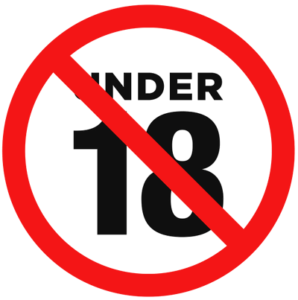Should Betting Be Banned On Sports With Under 18 Players?
 In August of 2019 Swedish regulators decided to fine four of its licensees for allowing punters to bet on sports with underage participants. Spelinspektionen, the country’s regulatory body, gave financial penalties and warnings to the companies because they allowed bettors to place wagers on events that had players under the age of 18, which has opened up a huge can of worms for the betting industry around the notion of how they’re supposed to handle events that have competitors that are underage.
In August of 2019 Swedish regulators decided to fine four of its licensees for allowing punters to bet on sports with underage participants. Spelinspektionen, the country’s regulatory body, gave financial penalties and warnings to the companies because they allowed bettors to place wagers on events that had players under the age of 18, which has opened up a huge can of worms for the betting industry around the notion of how they’re supposed to handle events that have competitors that are underage.
ComeOn, the subsidiary of Cherry AB, was responsible for three of the four guilty parties, with ComeOn Sweden being fined 6 million SEK, Hajper 4.5 million SEK and Snabbare given a 9 million SEK fine.
In 2021 bet365 were handed a 1 million SEK fine for taking bets on a training match where the majority of players were under 18. While 365 did state that they were unaware the match was classified as under 18 it goes to show how stringently Sweden are prepared to enforce these laws.
The majority of offences involved bets placed on European football league matches that featured players under the age of 18, whilst a non-ComeOn associated brand, Legolas Invest Ltd, was fined 100,000 SEK for allowing a bet on a single volleyball match. Given the nature of sports that people can place bets on, it naturally begs the question of what, exactly, betting operators are supposed to do in terms of the age of participants.
What Happened In Sweden?
 The crackdown by the Swedish gambling regulator Spelinspektionen involved fining four operators for allowing bettors to place wagers on sports that featured players under the age of 18.
The crackdown by the Swedish gambling regulator Spelinspektionen involved fining four operators for allowing bettors to place wagers on sports that featured players under the age of 18.
It isn’t the first such series of fines dished out by the regulator, who also fined eight different companies earlier in the year for similar offences. Betfair, Bethard, Casinostugan, Electraworks, Hillside, Polar Limited, TSG Interactive and Zecure Gaming were all handed fines of different amounts that Spelinspektionen felt were in line with the gravity of the offence that they were guilty of.
The largest fines were dished out to TSG Interactive, which runs PokerStars, and Hillside, with each company being on the receiving end of a fine in the region of $1 million. The fines on both occasions were given because the operators had allowed people in Sweden to place bets on events that featured people under the age of 18, including games that were played in Under-19 and Under-21 leagues.
The reason for the fines was that allowing the bets ran in contradiction to a new regulatory framework that forbids betting on events featuring people under age in order to avoid them being exposed to the possibility of match-fixing.
What It Means For The Gambling Industry
 Swedish law prohibits betting on sports that feature athletes that are under the age of 18, with Spelinspektionen stating that it’s taken the decision to have that cut off point in order to ‘protect the integrity of youth sports’.
Swedish law prohibits betting on sports that feature athletes that are under the age of 18, with Spelinspektionen stating that it’s taken the decision to have that cut off point in order to ‘protect the integrity of youth sports’.
The same laws do not apply in the United Kingdom, though the Gambling Commission does have rules and regulations in place to protect young people. Gambling logos are not allowed to appear on the football shirts of youth teams, for example, with Newcastle United charged by the Football Association when their Under-18 side wore shirts featuring the Chinese betting company FUN88 back in 2018.
Yet the charges issued by the Swedish regulator will leave UK-based companies scratching their heads and asking questions about whether or not it’s worth trying to conquer the Swedish betting market in the future. After all, the idea of not offering odds on events that feature people under the age of 18 is a tricky one to manage.
In July of 2019 Gaming Innovation Group decided to shut down its sportsbook in Sweden for its brands Rizk and Guts because of regulatory uncertainty. It came on the back of the company’s subsidiary, Zecure Gaming, being one of those fined by Spelinspektionen and the shutdown was based on the notion of the rules being ‘too open to interpretation’.
Can Age Of Participants Be Legislated Against?
 The major question that the situation in Sweden has thrown up for betting companies around Europe is how, exactly, they’re supposed to regulate the bets that they offer based on the age of the participants. Given that most of the complaints have been on football, how could sportsbooks allow punters to place bets on matches when there’s a chance that a team could feature a player under the age of 18?
The major question that the situation in Sweden has thrown up for betting companies around Europe is how, exactly, they’re supposed to regulate the bets that they offer based on the age of the participants. Given that most of the complaints have been on football, how could sportsbooks allow punters to place bets on matches when there’s a chance that a team could feature a player under the age of 18?
What makes things even trickier when it comes to football is the fact that players can be substituted on or off. Would companies be ok to accept bets on a match that features a team with a starting eleven of over 18-year-olds, only to then need to suspend betting if a 17-year-old is substituted on?
Conversely, of course, would companies be unable to offer bets if a 17-year-old was in the starting eleven, but then be able to start taking bets once the team that he plays for has replaced him with someone over the age of 18? You can see why betting companies are concerned about the precedent that has been set by the move from Swedish regulators.
Even if you only consider football as a sport, it’s an immensely complicated topic. It would make sense if Spelinspektionen had decided to fine operators for allowing bets on Under-18s matches, but that doesn’t appear to be what’s happened. The broad strokes nature of the fines to companies offering bets on events that feature people under the age of 18 is why companies are worried about what comes next
Some Sports Have In-Built Age Restrictions, Plenty Don’t
 Football is different from many sports because there is an increased chance that some participants will be under the age of 18. Yet it isn’t alone in that fact. Boris Becker was just 17 years and 227 days old when he won the Wimbledon Men’s Singles title in 1985, for example. More recently, Coco Gauff was 15 when she made headway in the US Open earlier this year.
Football is different from many sports because there is an increased chance that some participants will be under the age of 18. Yet it isn’t alone in that fact. Boris Becker was just 17 years and 227 days old when he won the Wimbledon Men’s Singles title in 1985, for example. More recently, Coco Gauff was 15 when she made headway in the US Open earlier this year.
Are betting companies allowed to offer odds on tennis matches that are between two people aged 18 or over but not on matches featuring someone under 18? What should they then do with bets placed on the outright winner of a tournament if they turn out to be under 18?
There’s just as big a problem when it comes to the likes of eSports, which regularly feature players that are in their teens. Indeed, Kyle Giersdorf was 16 when he won the Fortnite World Cup, which people were able to place bets on. It took place at the U.S.T.A. Billie Jean King National Tennis Center in New York, which is normally home to the United States Open, and he won $3 million in prize money for winning the solo event.
Why is it ok for him to win such huge sums but it’s not ok for people to be able to bet on him trying to do that? It’s an odd situation for betting companies to find themselves in and is unquestionably likely to cause more trouble as time passes if other regulators decide to follow Sweden’s lead.
Some sports already have built-in age restrictions, however. The youngest Formula 1 driver ever was Max Verstappen, who started a race as a 17-year-old in 2015, before the F1 restriction that required drivers to be 18 or over kicked in. Prior to Verstappen’s appearance at the Australian Grand Prix, the youngest driver was 19.
Equally it’s unlikely that a teenager would have the physical strength or have developed enough to play in the NFL in America, so the two sports there are pretty much protected from issues that surround betting on younger people because of the natural restrictions put on potential participants by the nature of the sport.
The question then comes down to whether or not players should be allowed to play if they’re under a certain age. If a golfer is good enough at 16 to compete with Rory McIlroy, Tiger Woods or Justin Rose then why shouldn’t they? If they’re the sort of person that might be tempted by match-fixing are they really going to be dissuaded from doing so simply because they aren’t allowed to bet on themselves thanks to arbitrary rules put in place by regulators?
The flip side of that, of course, is to ask at what age it is ok to bet on participants. Is betting on a match between two Under-12 football teams ok? If not, at what age does the cutoff come? It’s a complicated business.
There Is Inherent Hypocrisy At Play

The biggest complaint from sports betting operators, quite understandably, would be the hypocrisy at play if limits were put on the age of players that they were allowed to accept bets on.
A quick look at football teams in the UK shows that half of all Premier League teams were sponsored by betting companies for the 2019-2020 season, whilst that number goes up to 17 of 24 clubs if you look at the Championship instead. There’s also the irony that the Football League is sponsored by Sky Bet.
Why is it ok for football teams and organisations to take the money of betting companies but not for the betting companies to accept bets on those teams if they feature players under the age of 18?
It’s worth bearing in mind, of course, the fact that Labour’s Deputy Leader, Tom Watson, would ban betting companies from advertising on the front of football shirts if his party won a general election. It’s not as though the betting industry doesn’t have any restrictions put on it, therefore.
Yet the reality is that dozens if not hundreds of footballers under the age of 18 will be running around football pitches every weekend wearing shirts emblazoned with the logos of gambling companies, so it’s difficult not to point to the hypocrisy at play when regulators begin to dish out fines to companies that have allowed bets to be placed on sports featuring people under-18, as has happened in Sweden.



